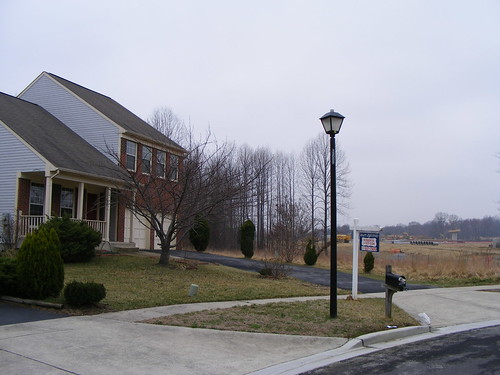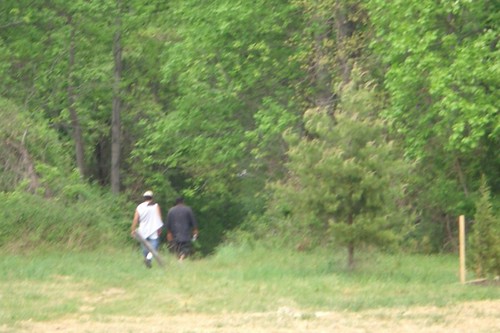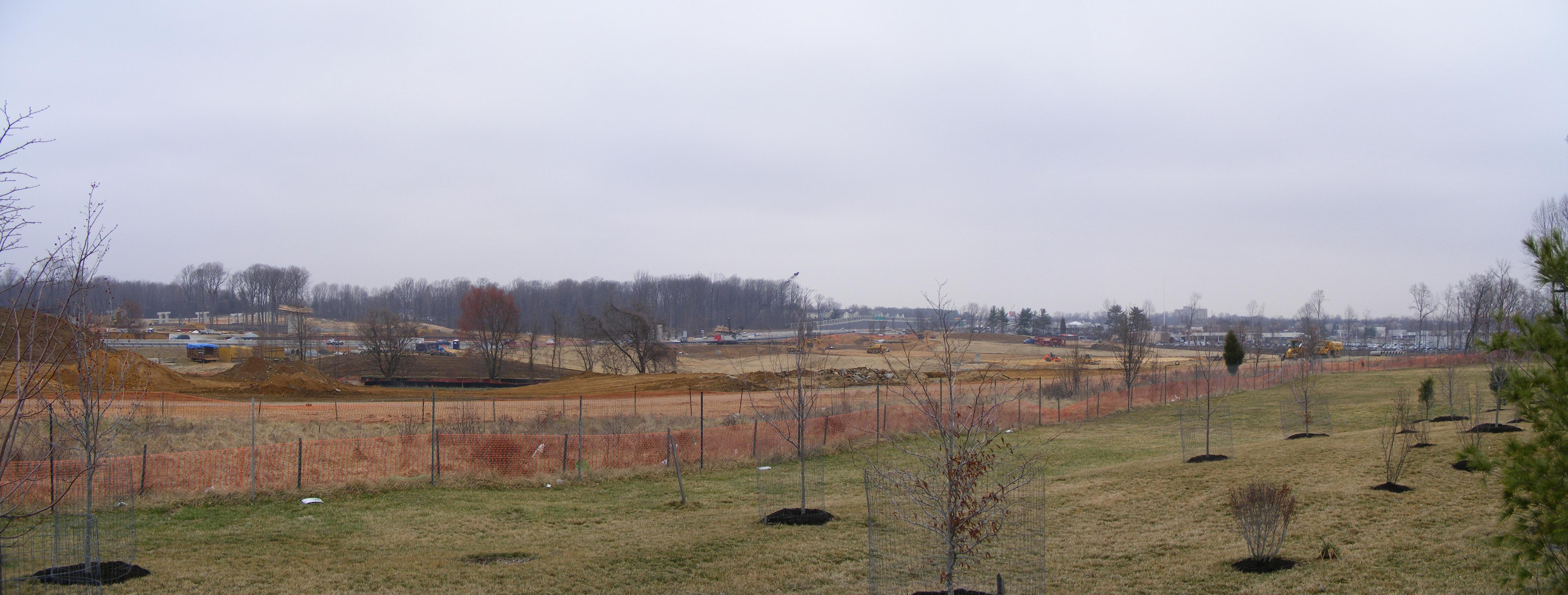 A sale sign outside a house in Tanglewood. The ICC is going up next door.
A sale sign outside a house in Tanglewood. The ICC is going up next door."Kids are going to be breaking out the lights," [McFadden] said. "Someone is going to get hurt and someone is going to be robbed."
"A positive aspect of the ICC construction, [Evans] said, is that robberies that once took place in the woods near Briggs Chaney no longer occur because the trees have been cleared."
 These quotes are from Bob McFadden and Dave Evans, president and board member (respectively) of the Tanglewood Homeowners' Association, which is fighting a tunnel the SHA proposes building underneath the InterCounty Connector, which is being constructed behind their neighborhood. Before the highway began construction, people could walk to Tanglewood through the stand of trees (at left) separating it from the Auto Park and Briggs Chaney, an area with a reputation for low incomes and high crime.
These quotes are from Bob McFadden and Dave Evans, president and board member (respectively) of the Tanglewood Homeowners' Association, which is fighting a tunnel the SHA proposes building underneath the InterCounty Connector, which is being constructed behind their neighborhood. Before the highway began construction, people could walk to Tanglewood through the stand of trees (at left) separating it from the Auto Park and Briggs Chaney, an area with a reputation for low incomes and high crime.Bridges and tunnels over highways don't have a good track record here. The footbridge over the Beltway in Forest Glen was the site of three armed robberies within six months of opening, but neighbors are still pushing for another tunnel that would improve pedestrian access to the Metro. There are other local footbridges I can think of (over Little Patuxent Parkway and Route 29 in Columbia; over I-270 in North Bethesda) that have been relatively quiet.
But Tanglewood is also a place where a small group of residents forced Metro to reroute a popular bus line away from their neighborhood because they wanted more parking spaces. They may mean well, but what I hear from these residents is "I've got mine, screw everyone else," and it's everything I hate about East County. Let's look:
Assumptions. McFadden automatically assumes that the tunnel will attract vandalism and crime.
Lack of trust in our youth. McFadden assumes not only that the tunnel will be vandalized, but that it'll be kids doing it.
Finger-pointing. Of course, these won't be kids from Tanglewood doing the dirty work. Resident Dave Evans believes that the tunnel will attract crime because it'll connect with the apartments on Briggs Chaney Road. "You might as well build [criminals] a fort," he's quoted as saying.
Perceived "safety" at all costs. Either Gazette reporter Robert Dongu is doing some sloppy reporting, or Dave Evans said that clear-cutting thousands of trees is worth keeping "unwanted" people from his neighborhood.
 Construction of the ICC seen from Tanglewood, as of last March. Click on the photo for a bigger version.
Construction of the ICC seen from Tanglewood, as of last March. Click on the photo for a bigger version.Tanglewood is not an affluent community. The little townhouses and condos here look just like the little townhouses and condos in Briggs Chaney. But Tanglewood does have a large, vocal Homeowners' Association, with people who have the time and money to speak out for their concerns, everyone else be damned. There are probably people in Briggs Chaney who have been inconvenience by the loss of access to Tanglewood or the re-routed bus line. But if they live in apartments, they don't have HOAs to represent them. And some can't afford to skip work or leave their kids at home to attend some meeting about a highway.
I mean, how many people are going to use a tunnel between Briggs Chaney and Tanglewood, anyway? The WashCycle blog pointed out last fall that, if McFadden and Evans want it to be really safe, they want as many people to use that tunnel as possible. It's all about "eyes on the street" - not from nearby buildings (which is what that phrase normally means) but from heavy use of the space.

2 comments:
Oh snap.
Speaking of "perceptions of crime and safety", on Monday night there was a Town Hall Meeting at Wheaton High School, on that exact subject.
It was well-attended by officers from every police department that has a neighborhood presence in Montgomery, from the County Department of Police to the MNCPPC Park Police and even the WMATA Transit Police were there. The only no-shows were the State Troopers -- not surprising as they have no patrol duties in Montgomery other than on the Interstate routes and occasionally on US-29, and the Sheriff's department, which in Montgomery is tasked as the enforcement arm of the Courts, performing bailiff, jails operations, and duty-services such as evictions or serving other court orders and notices.
Along with all of the LE-community representatives, there were several State and County higher-ups, Delegate Carr for example, and Nancy Floreen as another example. An aide from Mr Leggett's office was there, assorted people were passing out flyers and information sheets for their respective agencies, etc. A panel representing all of the agencies present -- including the Liquor Board -- made their presentations and responded to questions from the audience.
Yet with all of this heavy throw-weight, there was a profound lack of citizens in sight. I'm guessing that there might have been a dozen or so, if that many.
The statistics that were given amounted to this: crime in the Wheaton Central Business District ("CBD") is, generally, down, and the types of crimes have trended away from such things as robberies and armed robberies -- though these do still occur -- and have trended into such things as theft-from-vehicle and that sort of thing. Part of this may be due to more people having less reason to come to the Wheaton CBD due to having less money to go shopping, and part of this may be due to a rising level of police presence. Yet despite the actual statistics, the perception of Wheaton CBD as a dangerous place continues to rise.
Post a Comment